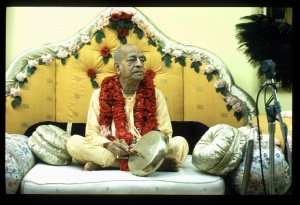CC Antya 1.35 (1975)

A.C. Bhaktivedanta Swami Prabhupada
Below is the 1996 edition text, ready to be substituted with the 1975 one using the compile form.
TEXT 35
- vṛndāvane nāṭakera ārambha karilā
- maṅgalācaraṇa ‘nāndī-śloka’ tathāi likhilā
SYNONYMS
vṛndāvane—at Vṛndāvana; nāṭakera—of the drama; ārambha—the beginning; karilā—wrote; maṅgalācaraṇa—invoking auspiciousness; nāndī-śloka—introductory verse; tathāi—there; likhilā—he wrote.
TRANSLATION
In Vṛndāvana, Rūpa Gosvāmī began to write a drama. In particular, he composed the introductory verses to invoke good fortune.
PURPORT
Śrīla Bhaktisiddhānta Sarasvatī Ṭhākura quotes from the Nāṭaka-candrikā, wherein it is written:
- prastāvanāyās tu mukhe nāndī kāryā śubhāvahā
- āśīr-namaskriyā-vastu-nirdeśānyatamānvitā
- aṣṭābhir daśabhir yuktā kiṁ vā dvādaśabhiḥ padaiḥ
- candra-nāmāṅkitā prāyo maṅgalārtha-padojjvalā
- maṅgalaṁ cakra-kamala-cakora-kumudādikam
Similarly, in the Sixth Chapter of the Sāhitya-darpaṇa, text 282, it is said:
- āśīr-vacana-saṁyuktā stutir yasmāt prayujyate
- deva-dvija-nṛ-pādīnāṁ tasmān nāndīti saṁjñitā
The introductory portion of a drama, which is written to invoke good fortune, is called nāndī-śloka.